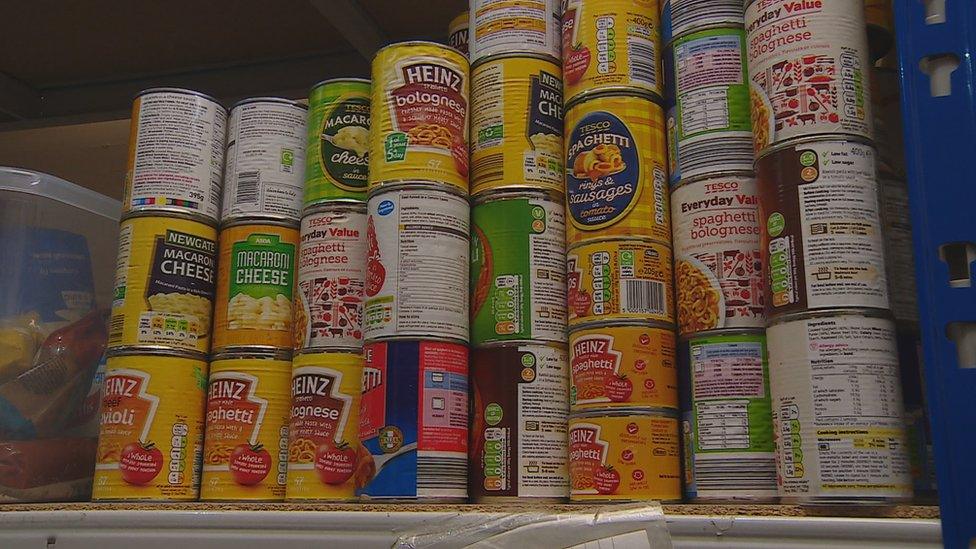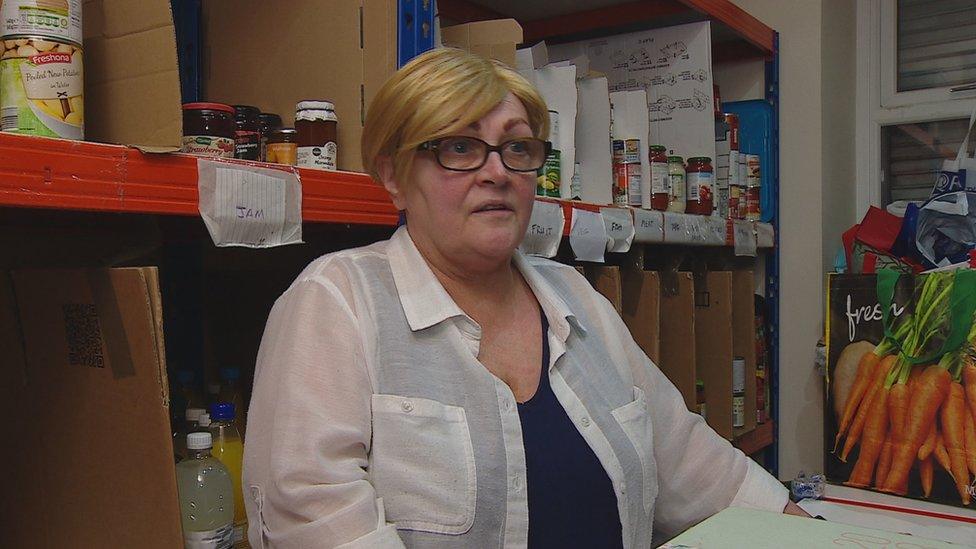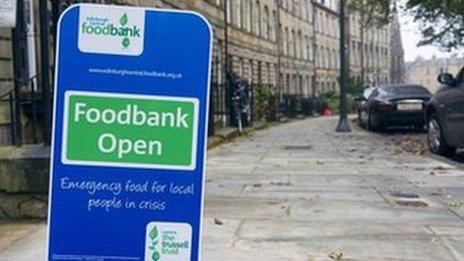Food parcel demand hits record high
- Published
- comments

The Trussell Trust said there had been a 17% increase in demand for emergency food supplies
Food banks in Scotland gave out a record number of food parcels last year, according to new figures.
More than 170,000 three-day emergency food supplies were distributed by The Trussell Trust's 52 food banks.
The charity said it saw a 17% increase in demand north of the border in 2017/18, compared to the previous year.
And it claimed a growing proportion of people referred to Scottish food banks have found that their benefits do not cover the cost of essentials.
However, the UK government said it was wrong to link a rise in food bank use to any one cause as the reasons why people use them are complex.
Last year The Trussell Trust reported that it had provided more than 145,000 packages to people in crisis in 2016/17.
The key findings of its latest report were:
170,625 food parcels were distributed in Scotland in 2017/18 - 17% more than in the previous year
55,038 parcels went to children
28% of referrals were on a low income, receiving benefits (up from 22% in 2016/17)
Debt accounted for 8% of referrals, up from 7% last year
Benefits delays (22%) and benefit changes (18%) accounted for a large number of referrals
Detailed analysis of a smaller proportion of referrals also revealed that the number of people turning to food banks after receiving a benefits sanction had fallen.
The charity estimated it helped approximately 666,476 people last year, as on average people attended their food banks twice.
It said the proportion of low income households seeking help from its food banks had increased significantly since April 2016.
And it suggested there was an "urgent need" to look at the adequacy of current benefit levels.

The view from a food bank

Audrey Flannigan manages one of The Trussell Trust's food banks in Glasgow.
She said people whose benefits did not stretch to buying essentials were using the service.
"They need to be able to buy things like soap, toothpaste, put money in the meter, they need to be able to buy the kids new shoes or clothes when they need them," she said.
"One of the biggest things has been the change on to Universal Credit," she added.
"I'm in no way a benefits adviser or know everything about it, but I do know that asking someone to wait between five and seven weeks before you get your first lot of money surely has to be seen as immoral and inhumane."

'It's embarrassing, but you can't live on fresh air' - The experience of using a food bank
Tony Graham, the director of Scotland at The Trussell Trust, said no-one in Scotland should be left hungry or destitute.
"Food banks are providing absolutely vital, compassionate support in communities across our country, but no charity can replace the dignity of having long-term financial security," he added.
"It's completely unacceptable that anyone is forced to turn to a food bank in Scotland, and we'll continue to campaign for systemic change until everyone has enough money coming in to keep pace with the rising cost of essentials like food and housing.
"Universal Credit is the future of our benefits system. It's vital we get it right and ensure levels of payment protect everyone needing its support, particularly groups of people we know are already more likely to need a food bank - disabled people, people dealing with an illness, families with children and single parents.
"This, along with a Good Food Nation Bill, external that addresses hunger and destitution, can ensure Scotland leads the way in ending the need for food banks."
A spokeswoman for the Department of Work and Pensions said it was wrong to link increased food bank use to any one cause.
She said: "This research is based on anecdotal evidence from a small, self-selecting sample of less than 0.04% of current Universal Credit claimants, whereas Universal Credit is working for the vast majority who claim it.
"It was also carried out before our significant improvements to Universal Credit came into effect at the Budget; such as 100% advances, which support people before their first payment, removing the seven waiting days and two weeks' extra housing support for claimants moving onto Universal Credit.
"Since 2010, one million people have been lifted out of absolute poverty and employment is at a record high with over 3.2 million more people in work - equating to an extra 1,000 people employed a day, every day.
"Meanwhile we continue to spend £90bn a year on welfare to support those who need it most. The best way to help people improve their lives is through employment, with people on Universal Credit moving into work faster and staying in work longer."
- Published25 April 2017
